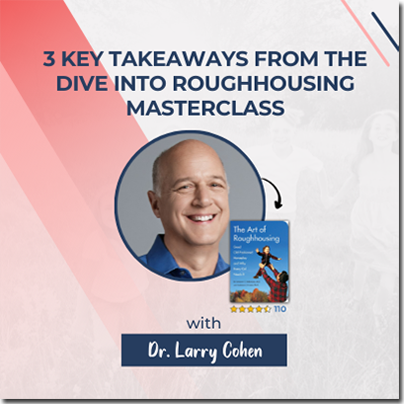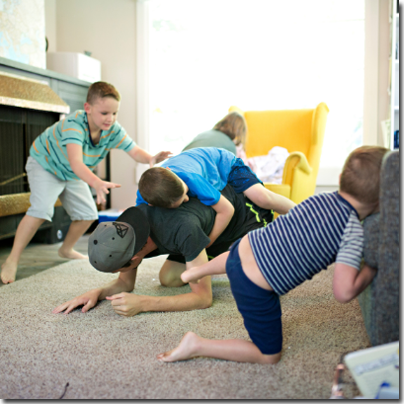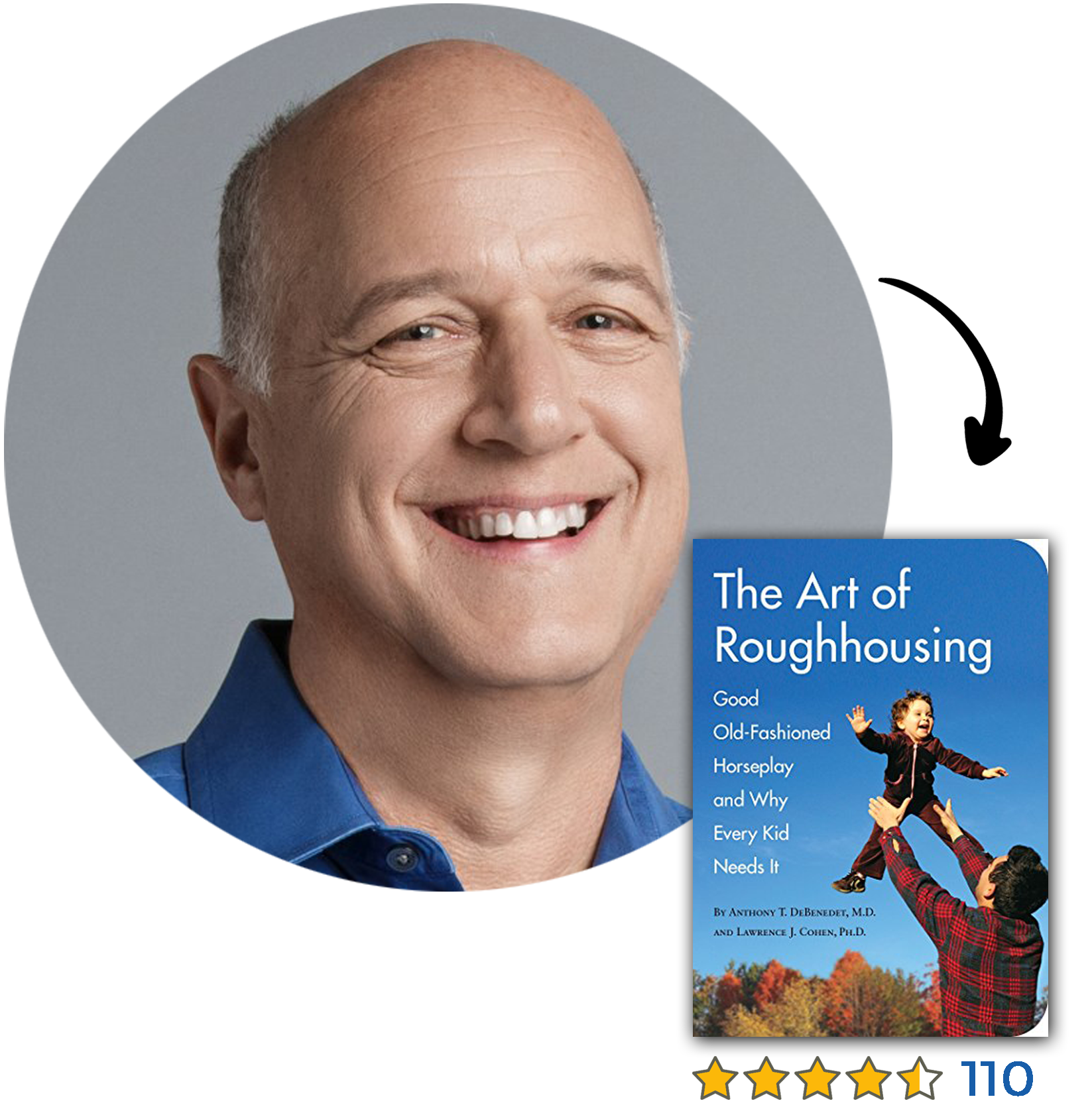 Very soon we will have the opportunity to delve deep into the world of positive parenting— that’s right, the Positive Parenting Conference is right around the corner! One really powerful masterclass this year is with Dr. Larry Cohen and focuses on his book The Art of Roughhousing: Good Old-Fashioned Horseplay and Why Every Kid Needs It.
Very soon we will have the opportunity to delve deep into the world of positive parenting— that’s right, the Positive Parenting Conference is right around the corner! One really powerful masterclass this year is with Dr. Larry Cohen and focuses on his book The Art of Roughhousing: Good Old-Fashioned Horseplay and Why Every Kid Needs It.
I imagine many people have a preconceived idea of what roughhousing is and how to do it. “Just wrestle!” Right? Or maybe, “That sounds dangerous.” Dr. Cohen’s grounding and encouraging spirit will not only open your eyes to the many varieties of roughhousing that are possible, but he will also help you prepare for high-quality roughhousing, which (spoiler alert!) is very helpful in raising confident, happy, ethical kids.
Dr. Cohen, who co-authored the book, is most well-known for his book Playful Parenting, which has been translated into 14 languages and was the winner of the NAPPA Gold Award for parenting resources. He is also a licensed psychologist specializing in child’s play and play therapy; has a private psychotherapy and play therapy practice. So, he really knows roughhousing.
If you are already a Dr. Cohen fan, this masterclass will take you deeper into his favorite ways to roughhouse with kids. It’ll help support you on your roughhousing journey. If you haven’t yet engaged with Dr. Cohen’s work, this masterclass is a great way to learn all about why you want to start roughhousing with your family right away!
I was lucky enough to get an early look at the Dive Into Roughhousing Masterclass as the masterclass researcher. While there are so many helpful ideas in this masterclass, what stands out most to me is Dr. Cohen’s focus on connection as preparation for (and participation in) roughhousing, our role in helping develop emotional and physical safety with our kids, and the bonus fun of an extra big exaggeration from us parents.
#1: It’s All About Connection
 Although many positive parenting books highlight the importance of connecting with your child, it can be hard to know exactly how to connect. Even though I try really hard to stay connected with my children, there are times when it just doesn’t happen the way I want. Something that deeply resonated with me in this masterclass was when Dr. Cohen said that in order to start connecting with our children, we need to tune in to them, rather than swoop in.
Although many positive parenting books highlight the importance of connecting with your child, it can be hard to know exactly how to connect. Even though I try really hard to stay connected with my children, there are times when it just doesn’t happen the way I want. Something that deeply resonated with me in this masterclass was when Dr. Cohen said that in order to start connecting with our children, we need to tune in to them, rather than swoop in.
A classic example of swooping (what we do not want to do) is this: We get home from work, scoop up our child and immediately fly them around the house like an airplane. Unfortunately, that child was just deeply engaged in reading their favorite book, building a Lego tower, or playing trucks at the sensory table. Even though they missed us while we were apart all day, they weren’t ready to be picked up and flown around the house! So, they cry, squirm, or yell. Not only are they not connected, but they are also now upset.
Instead, we can tune in to our kids: We get home from work. Our child is reading quietly on the couch. We go over and sit next to them and just watch them read for a few moments. We breathe in their smell and witness their concentration. Then, we calmly say “It’s so wonderful to see how much you are enjoying your book. I am home now, and I would love to play with you when you are ready.” Our child feels seen. And when they are ready, they will happily fly around the house with us.
For me, connecting with my oldest child first thing in the morning can be a challenge. I’m still nursing our younger child, so he and I are usually connected quickly during morning nursing. Meanwhile, my oldest has been up and at full speed for an hour, doing science experiments and creating new gadgets with my partner downstairs.
I’ve learned that when I eventually come downstairs, I need to find a way to connect with my daughter so she also feels some morning love from me. While I would love to run up to her and give her a big hug, she is usually engaged in a project. She needs a little time and the opportunity to tell me all about the new version of the leprechaun trap she created before she is ready for me to ask for a hug. This has been an adjustment for me, but I can see how much tuning in has allowed for better connection.
Connection is important for roughhousing; our children need to feel connected to have a trusting and loving roughhousing session. It is also true that roughhousing itself is an incredible way for us to connect with our kids! So, we tune in to our kids in preparation for roughhousing, and then the connection we get by actually roughhousing has a further positive impact on our kids (and us)!
A great way to start tuning in and preparing for roughhousing is a game that Dr. Cohen calls “forcefield hands” or “pushing hands.” For this activity, stand face to face with your child with both of your hands up, palms facing each other but not quite touching. Try to feel the energy that flows between your hands and then try pushing your hands back and forth just with the energy moving between you. Then, touch your hands to each other and try to match each other’s intensity as you push into each other’s hands.
Eventually you can add a little competition and try to push each other (let them push you into the kitchen! You can gently push them into the dining room!). At that point you will have to be tuned into each other. This is a great game to play to connect or as a lead-in to roughhousing!
#2: Our Role in Building Emotional and Physical Safety with Our Kids
 Roughhousing also has the benefit of helping our kids develop their own sense of emotional and physical safety. Dr. Cohen speaks so clearly and eloquently about this that I have been thinking about it ever since watching the masterclass.
Roughhousing also has the benefit of helping our kids develop their own sense of emotional and physical safety. Dr. Cohen speaks so clearly and eloquently about this that I have been thinking about it ever since watching the masterclass.
Dr. Cohen is a huge proponent of risky play. I appreciate the confidence that he gives to parents in an effort to support risky play in our own homes and allowing kids to do it at school as well. In our family we do a lot of risky play. It can be scary to watch my six-year-old scale the banister all the way to the top, jump out of her tree fort or off of a huge boulder; and it can quicken my pulse to see my two-year-old watch and learn from what she does.
And yet, as I bite my tongue and take deep breaths, I am comforted by remembering Dr. Cohen’s words:
“Risk is determining for yourself what’s safe, what you’re ready to do…We want children to develop that inner trust in themselves. And that’s where the real confidence comes from.”
So, when we actually step back and let our children assess their own sense of risk, they are developing a true understanding of themselves. When we say “be careful,” or “that’s too high,” or even “just jump! That’s easy,” we are actually interfering with their learning.
Dr. Cohen shares a personal example of being overly cautious and interfering with his daughter’s learning while at the playground. His friend, who was also there with a child, said:
“You know Larry, she is going to recover much better from a broken arm than from being timid and fearful her whole life.”
While it was hard to admit that his friend was right, Dr. Cohen saw how he was getting in the way of his daughter’s learning. “What is the goal?” He asks. “Protect from every little hurt? No. To empower kids to be confident and powerful and know for themselves what is safe and what is dangerous.”
One phrase we have adopted in our house is, “Do you feel safe?” When said in a neutral tone, it allows the climber/jumper/wall-scaler to think about it for themselves and allows the speaker the assurance that the risk taker is self-assessing. Sometimes I just keep my mouth shut and breathe; other times I ask, “Do you feel safe?” and then watch my kids think about the answer. Usually, they say yes. Sometimes they say no and climb down. Either way, they are learning to develop their own sense of safety.
Our child’s sense of emotional safety is also developed through good roughhousing. Dr. Cohen encourages parents to stay away from saying “You are fine.” This, he says, interferes with the self-development of emotional safety. The truth is, “If a child doesn’t feel safe, then it’s not safe.” We need to trust in our kids and ask questions rather than implying or telling how they feel or what they are capable of. If we allow them, our children are pretty remarkable and are very capable.
The next time your child falls and says they need a band-aid (even though they are not bleeding and you see no evidence of falling), give them the band-aid. It might just represent a need for being taken care of–and we can meet that need. When our children learn that they will be taken care of when they ask to be, they feel emotionally safe. If your child seems scared to climb as high as their friend at the playground, that’s okay too. You might know they can do it, but they need to feel it for themselves.
The next time your child is climbing something that pushes your sense of safety, consider biting your tongue, taking a few deep breaths and watching them develop their own sense of safety. Or you could ask, “Do you feel safe?” (Without letting any of your fear creep into your voice) and see what they say.
#3 The Extra Big Exaggeration
 My last big takeaway from Dr. Cohen’s masterclass is our need to lean into the silliness and playfulness of roughhousing. The harder we fall, the bigger we act out our role of the bumbling monster; the more we play the fool, the better.
My last big takeaway from Dr. Cohen’s masterclass is our need to lean into the silliness and playfulness of roughhousing. The harder we fall, the bigger we act out our role of the bumbling monster; the more we play the fool, the better.
I love to play games and roughhouse with my kids, but to be honest, sometimes I forget to be silly. I think I’m too focused on trying to do this whole parenting thing “well” and I forget that laughter and fun in the moment can be the best part of parenting (and maybe parenting at its best).
In comes Dr. Cohen’s extra big exaggeration. What if, when you are playing the forcefield game and it is your child’s turn to push you around, you pretend to fall really hard? Or if you got really confused about which room you were in and needed your child’s help figuring it out?
The big exaggeration is where a lot of the fun lies for kids. So much of their young lives are spent being the smallest, the clumsiest, the least powerful; but with roughhousing they can be big, strong, powerful, stay on their feet, feel confident, and on top of the world. We can help this role reversal if we play the role of the smallest, most powerless, clumsy, confused, silly one who needs their help.
This is a weakness of mine–and yet, when I do it, it is so much fun and my kids laugh so hard! After watching Dr. Cohen’s masterclass, I have made it a goal to do something every day that plays into this idea of big exaggeration. Instead of launching into a lecture about losing with grace when my six-year-old starts changing the rules or whining during a game, I bite my tongue and play the sore loser, selling my upset at losing dining room soccer yet again…for the twelfth time this week!
Instead of another power struggle, we both get to have fun. Instead of “tightening the knot” of tension that exists for my child around losing, we get to “loosen the knot,” and laugh. Dr. Cohen explains that our children actually become better sports through playing the big exaggeration than through being lectured.
So next time you get a chance to play something with your child, bring out your acting skills and play the fool! Falling or putting your clothes on all the wrong parts are always good places to start. If you sell it well, I think you will find both you and your child will be filled with laughter.
There were so many takeaways from Dr. Cohen’s masterclass that it was close to impossible to choose just three. I hope you’ll consider trying some of the ideas here right away, and then I hope you tune in to the Positive Parenting Conference and watch Dr. Cohen’s masterclass. No matter where you are on your roughhousing journey with your family, there is something for you.
 You can watch the full Dive Into Roughhousing Masterclass with Dr. Larry Cohen for FREE during the online Positive Parenting Conference between May 17th – 24th, 2022. Each year 100,000+ parents join us for this amazing online event. Don’t miss it!
You can watch the full Dive Into Roughhousing Masterclass with Dr. Larry Cohen for FREE during the online Positive Parenting Conference between May 17th – 24th, 2022. Each year 100,000+ parents join us for this amazing online event. Don’t miss it!
Up Next…
Have you ever caught yourself deflecting your own anxieties onto your children? Yeah, us too!
Join us next week as we discuss key takeaways from the Non-Anxious Parenting Masterclass with Dr. William Stixrud.
This informative masterclass is packed with insights about how our own anxiety can unintentionally increase our child’s and how we can retrain the way we support our children so that it’s done in a non-anxious manner. Stay tuned next week for tips and tricks to being the kind of listener and motivator that our children need.
Leave a Reply